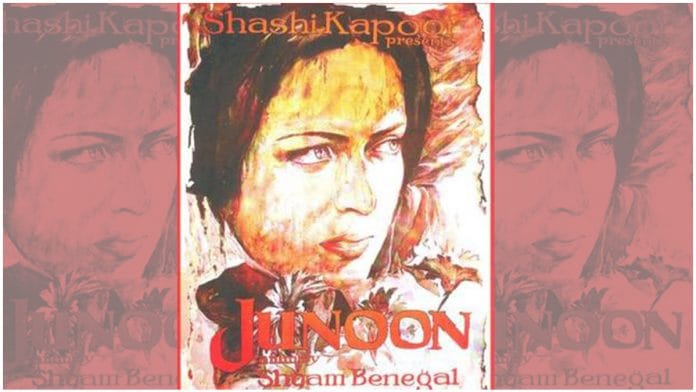What do you get when you mix Ruskin Bond, Shyam Benegal, Govind Nihalani, Shashi Kapoor, Naseeruddin Shah, Shabana Azmi, Ismat Chughtai, Jennifer Kendal, Nafisa Ali and a host of other brilliant actors with the sweeping historical drama and action of the Revolt of 1857? The answer is Junoon.
The word means obsession, and it throbs in every frame of the movie, every word, every
silence between lovers and every anguished sepoy’s cry.
Based on Bond’s novella, A Flight of Pigeons, the 1978 movie directed by Benegal was a
landmark in terms of its all-star ensemble cast and its exceptional cinematography courtesy Nihalani. It went on to win three National Awards (including Best Feature Film in Hindi), and six of the eight Filmfare Awards it was nominated for. And it is widely considered one of Shashi Kapoor’s (also the producer of the film) finest movies. In the week of his birth anniversary, there is, perhaps, no better film to revisit.
Also read: The champion of masala films, Manmohan Desai made Bollywood what it is today
The junoon of romance and of revolt
The movie is set in a small British cantonment in Rohilkhand, Uttar Pradesh. It opens with
Amrish Puri’s unmistakeable baritone narrating the events leading up to the Revolt of 1857,
beginning with the execution of Mangal Pandey.
Naseeruddin Shah plays Sarfraz, a rebel who is actively plotting against the British and
participates in massacre at the local church. Ruth Labadoor, a young British woman (played
to perfection by debutante Nafisa Ali) is traumatised at having witnessed her father’s death at the hands of Sarfraz.
In the meantime, Sarfraz’s elder brother-in-law, a surly, unpleasant feudal Pathan
chieftain named Javed (Kapoor), whose gentleness is reserved for his carrier pigeons, has long been in love with Ruth, despite not having exchanged even one word with her. Knowing that the British are in danger, he uses the opportunity to get Ruth, her mother Miriam (Kendal) and her grandmother (Chughtai, who also co-wrote the dialogue) to move into his house. His solution to the problem? He will marry Ruth.
Never mind that he has a wife already, the feisty, opinionated Firdaus (Azmi). Never mind
that Ruth has not actually consented to this marriage, or that she is, as her mother reminds Javed, too young. Never mind that she’s a Christian. Never mind that his brother-in-law killed her father. Because when Javed looks at Ruth, all of that melts away in the fire of his junoon.
He’s not the only one with a strong will, though. As firm as he is that he will marry Ruth, her mother is equally firm that he will not. (And it is testament to Kendal and Kapoor’s acting abilities that one is able to forget they were married in real life.) She eventually strikes a deal with him – if the sepoys win Delhi, he can marry Ruth, but if the British take the city, he will leave her alone. Grudgingly, arrogantly, he agrees.
In today’s times, a man like Javed would be slammed for his patriarchal views and manner. But this is 1857, when social mores were rather more misogynistic, so the fact that Javed has not forced Ruth into marrying him is seen as a sign of good character and noble Pathan values. But strangely, despite detesting Javed with all your 21 st -century mores, you still find yourself rooting for him and his love for Ruth, and that is solely because of Shashi Kapoor. The tortured love in his eyes, the angry snarls, the fleeting regret he feels after he lashes out at Firdaus that she cannot give him an heir and that last scene, mid-battle, when he rides his horse hell for leather to the church and begs and pleads with Ruth’s mother to just let him see her one last time – Kapoor humanises Javed beautifully.
Also read: Spot boy Salim Shaikh is called ‘Action’ & loved Shashi Kapoor for bringing food for all
Nafisa got her break and found love
Every performance is outstanding, but special mention must be made of Nafisa Ali. Just 21
years old, the debutante delivered a performance that stuns with its silence. She says barely a few words in the movie, but lets her eyes and shy smile do the talking. Fun fact: the movie was not only her break in Hindi cinema, but also her meet-cute with the man she would marry in real life, Colonel RS Sodhi. In an earlier interview, she said, “The battle scene in Junoon was shot in my husband’s regiment so I knew all the officers. He was the only bachelor. When he came to Kolkata for a horse show and polo match, I got to know him better. And when I went to Delhi for the Junoon premiere, he wooed me with horses. I loved horses, so the whole romance was around them!”
War rages outside, but the women find ways to bond
Junoon is a loud film, with plenty of screaming and roaring. But one of its most powerful scenes is actually one of its quieter ones. Ruth, Miriam, her mother, Javed’s aunt (played by Sushma Seth) and her daughter (Deepti Naval) are sitting in a park. The two young girls take turns on a swing, while Javed’s cousin sings a Hindi song. She coaxes Ruth to sing as well, so Miriam and she sing an old English ballad. The five women don’t all understand both languages, they don’t all understand each other’s words, but it’s a beautiful scene of female bonding and barriers breaking through song. From then, you know that at least these five women will look out for each other, because, as one of them says, when war happens, it is the women who have to bear the consequences.






